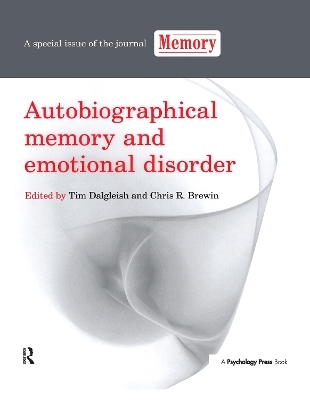
Autobiographical Memory and Emotional Disorder
Routledge (Verlag)
978-1-84169-833-5 (ISBN)
- Titel z.Zt. nicht lieferbar
- Versandkostenfrei
- Auch auf Rechnung
- Artikel merken
For those suffering from emotional disorders such as posttraumatic stress disorder (PTSD) or depression aspects of the personal past can dominate conscious experience in tenacious and toxic ways. For example, memories of distressing autobiographical experiences can intrude into awareness as thoughts or images, as flashbacks or nightmares, each laden with unwanted and painful affect. This special issue of Memory focuses on two broad themes. The first is the nature of autobiographical remembering of the personal past —what are the characteristics of such memories? And to what extent are they phenomenologically distinct from other types of autobiographical remembering? The second theme concerns varieties of difficulties in remembering emotional experiences from complete amnesia to lack of specificity of autobiographical recall. This volume draws together the world’s leading theorists and researchers on these varied issues to provide a broad overview of the cutting-edge work in this field.
Tim Dalgleish is part of the Emotion Research Group at the MRC Cognition and Brain Sciences Unit, Cambridge. Chris R. Brewin is at the Sub-Department of Clinical Health Psychology, University College London.
T. Dalgleish, C.R. Brewin, Editorial: Autobiographical Memory and Emotional Disorder. C.R. Brewin, Autobiographical Memory for Trauma: Update on Four Controversies. A. Speckens, A. Ehlers, A. Hackmann, F. Ruths, D. Clark, Intrusive Memories and Rumination in Patients with Posttraumatic Stress Disorder: A Phenomenological Comparison. M. Pasupathi, Telling and the Remembered Self: Linguistic Differences in Memories for Previously Disclosed and Previously Undisclosed Events. R. Meiser-Stedman, P. Smith, W. Yule, T. Dalgleish, The Trauma Memory Quality Questionnaire: Preliminary Development and Validation of a Measure of Trauma Memory Characteristics for Children and Adolescents. R. McNally, Betrayal Trauma Theory: A Critical Appraisal. J. Freyd, A. DePrince, D. Gleaves, The State of Betrayal Trauma Theory: Reply to McNally (2006), Conceptual Issues and Future Directions. C. Crane, T. Barnhofer, J.M.G. Williams, Cue Self-relevance Affects Autobiographical Memory Specificity in Individuals with a History of Major Depression. P. Spinhoven, C. Bockting, I. Kremers, A. Schene, J.M.G. Williams, The Endorsement of Dysfunctional Attitudes is Associated with an Impaired Retrieval of Specific Autobiographical Memories in Response to Matching Cues. S. Schönfeld, A. Ehlers, I. Böllinghaus, W. Rief, Overgeneral Memory and Suppression of Trauma Memories in Posttraumatic Stress Disorder.
| Erscheint lt. Verlag | 7.6.2007 |
|---|---|
| Reihe/Serie | Special Issues of Memory |
| Verlagsort | London |
| Sprache | englisch |
| Maße | 219 x 276 mm |
| Gewicht | 498 g |
| Themenwelt | Geisteswissenschaften ► Psychologie ► Allgemeine Psychologie |
| Geisteswissenschaften ► Psychologie ► Biopsychologie / Neurowissenschaften | |
| Geisteswissenschaften ► Psychologie ► Persönlichkeitsstörungen | |
| ISBN-10 | 1-84169-833-4 / 1841698334 |
| ISBN-13 | 978-1-84169-833-5 / 9781841698335 |
| Zustand | Neuware |
| Haben Sie eine Frage zum Produkt? |
aus dem Bereich


